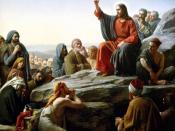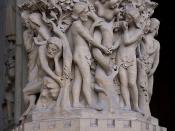Religious Beliefs of the Ancient Mesopotamians and the Hebrews
The ancient Mesopotamians and the Hebrews had significant differences in their religious beliefs and these differences shaped their societies.
Religion was the basis of civilization for the ancient Mesopotamians; it dominated every aspect of their lives. The ancient Mesopotamian society was built upon mythopoeic thinking. This way of thinking based on myths, led them to believe in Polytheism, the belief in many gods. These gods controlled universally. The "ancient Mesopotamians saw gods and demons everywhere in nature."(13) Each god served a different purpose; there were gods of the sun, moon, storms, river, and fire and in all other things. There were also the demons; they caused the disasters and sickness.
Hebrew beliefs were different than that of the ancient Mesopotamians. The Hebrews had an ethical and moral view about religion, they believed in Monotheism, the belief in one god, Yahweh. The Hebrews "demythicized nature"(40) in that there were no gods in nature.
They believed god was fully sovereign, and that he was the beginning of all things and he controlled all that was. They also believed that he was a god of transcendence "above nature and not part of it," (40) he crossed over into all things.
The ancient Mesopotamian people believed that humans were created to serve the gods completely. They were slaves to the gods, always trying to appease them with prayer and sacrifice. Anything that happened good or bad they attributed to the gods. Every act performed by the people was either the will of or for the gods.
The Hebrews believed that god created them not as slaves like the Mesopotamians believed, but to fulfill their own individual moral potential. They had free will and conscience as individuals, and the moral freedom to choose between good and...


